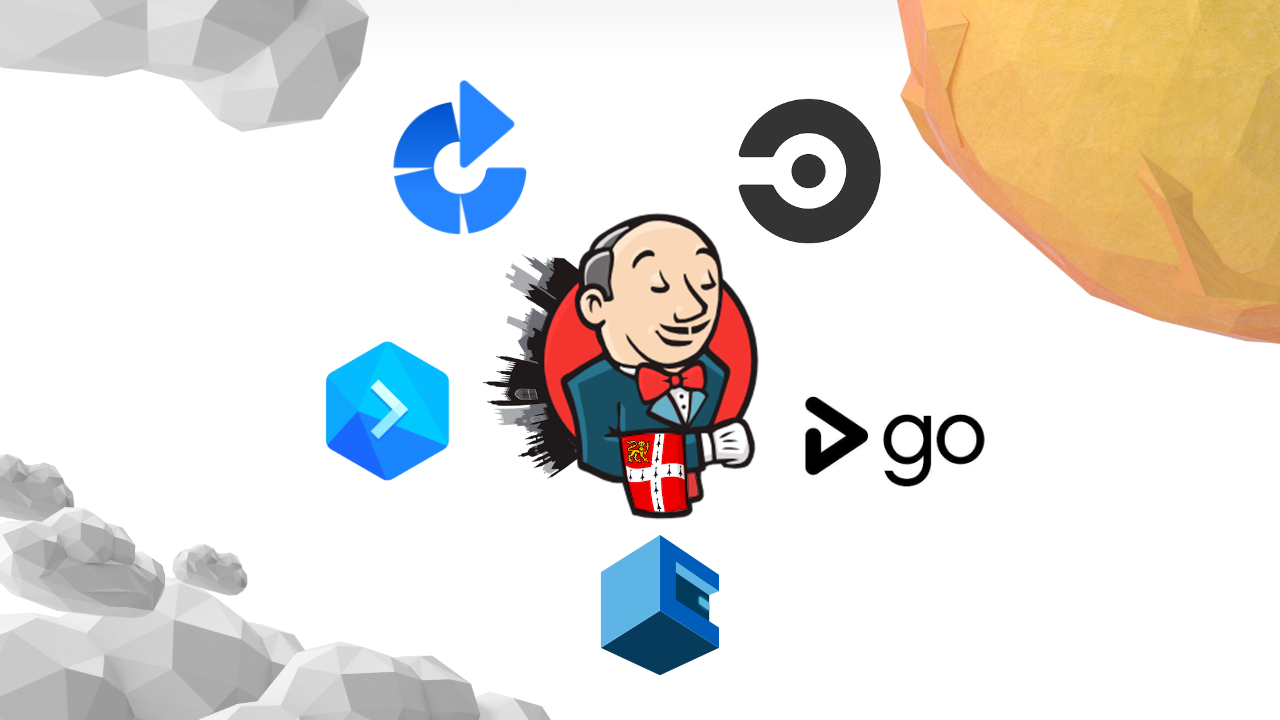
Top 5 Jenkins Alternatives in 2024: Automation of IT Infrastructure
The Automation of IT infrastructure is the gateway toward the digital transformation of any organization. Automation is just not about streamlining some of the IT processes, server automation transforms the overall functioning and performance of IT organizations. Some of the major outlines of server automation are reduced cost, better time management, decreased server downtime, and faster deployment. All these features of server automation make it one of the most exciting aspects of digital transformation. In this guide, We will look forward to the top 5 Jenkins Alternatives.
Short on time? These are the best alternatives to Terraform:
- Attune – Enjoy up to 42x faster server builds, 41% faster dataset reloads, and 4x faster system upgrades.
- CircleCI– Get unparalleled performance and insights with CircleCI’s interactive dashboard and automatic upgrades – revolutionizing the way you build and deploy your applications.
- Bamboo – Ultimate platform for agile teams seeking effortless configuration, powerful Git workflows, and lightning-fast parallel testing
One of the key elements of server automation is continuous integration/continuous development (CI/CD) tools. These tools have a great impact on the developer’s performance and the overall IT operations of the company. These CI & CD tools are enabling developers and operations teams to be more productive by automating most of the processes and reducing the manual effort involved, hence eliminating the chance of human errors. These tools help dev and ops teams in all phases of the SDLC from testing, merging code, and pushing the code from one environment to a different environment i.e. from staging to production.

One such CI/CD tool is Jenkins. This is one of the very first tools used when the concept of server automation was introduced. Jenkins has been like a default standard CI/CD tool for DevOps teams for the past many years. But over time, it is getting outdated and teams using it are facing some difficulties. So maybe it’s time to look for alternatives.
This article will walk you through the top 5 alternatives of Jenkins, but let’s begin with getting a brief idea about what is Jenkins, and why there is a need for its alternatives.
What Is Jenkins And Its Major Issues?
Jenkins is one of the oldest and most popular CI/CD tools that is being by DevOps teams. It has been in the market for a long and one of the great things about Jenkins is that it is open-source and free. So, there are no restrictions on who can use this tool. The main purpose behind the creation of this tool was to be able to build great automation servers. Jenkins is one of the software used for continuous integration, by building and testing software projects continuously.
One of the major features of Jenkins is Plugins, there are a lot of Jenkins plugins available that you can easily use for anything, from automation testing to automation builds and for deployment on different servers.
Well, it is rightly said that everything has its time to shine and then it starts losing its charm. It is 2021 and the same is the case with Jenkins, In the past few years, the IT teams that are using Jenkins are facing several issues.
Some of the major issues in Jenkins are:
- A lot of Jenkins plugins are not being maintained and have become redundant. This is causing issues of compatibility with the new declarative pipeline style.
- As Jenkins is getting old, its design and user interface are also not up to date. The Jenkins user interface is also not very friendly.
- Jenkins does not provide any analytics information about the servers or tasks being performed.
- Jenkins is highly customizable, but the authority and ability to customize whatever you want sometimes create a lot of confusion and mess.
- Jenkins is free and open-source, but it is complicated and requires a high-level skill set to operate. Many teams are now feeling that Jenkin’s resources are now becoming a burden for them.
Factors To Consider When Switching From Jenkins
If you have searched about Jenkins alternatives and you are reading this article, then there must be one of the three reasons you are here. You are already using Jenkins and are fed up with facing different issues and looking for a change. Or maybe you haven’t faced any issues yet but have heard the stories about Jenkins issues and looking to avoid them by choosing an alternative. The third reason could be, that you are starting your business and don’t want to use Jenkins and looking for alternatives.
Well, for whatever reason you are here the point is that you want a Jenkins alternative that is similar to Jenkins. You must consider and evaluate some of the points according to your situation before deciding which tool to choose. Let’s briefly discuss some of these factors.
- The critical factor when deciding about any tool or technology is its pricing model and cost. As mentioned above, Jenkins is free and open-source, making it a default choice for many companies. Most of the Jenkins alternatives have a free basic version but some have different pricing structures based on User, Per Remote Agent, and Per Current Job. So when looking for a Jenkins alternative, keep the pricing factor in mind.
- Server automation tools are usually based on two working models, i.e. self-managed and vendor-managed (SaaS). Jenkins is based on the self-managed model and can be hosted anywhere on the cloud or premise. While some of the CI/CD tools are vendor-managed, they are simple to use but you don’t have much authority over the customization.
- One of the most important elements when deciding on a tool is its capabilities. Jenkins is only a CI tool, while many new tools have CI/CD capabilities. Based on your requirements you can decide which tool suits you better.
Alternatives Of Jenkins
There are a lot of tools now available in the marketplace that can be used as Jenkins alternatives. It is not possible to compare any tool side by side with Jenkins, anyhow let’s see some of the tools similar to Jenkins.
Circle CI
Circle CI is one of the most popular Jenkins alternatives available in the market currently. This is a cloud-based flexible CI/CD tool and is very easy to maintain. This is a multi-platform tool and can run on any platform like Python, API server, or Docker. Circle CI is usually known for its speed, scalability, and performance. Whenever you perform a commit, it leads to automatic build execution.
Features of Circle CI
- It can support multiple languages like C++, Python, Ruby, and many more.
- It has automatic upgrades, so very easy to maintain.
- Reduced build time, by splitting tests in multiple containers.
- Provides efficient performance with optimal cashing and parallelism.
- Show critical insights with the help of an interactive dashboard.
Bamboo
Bamboo is an Atlassian-based CI tool. Bamboo can be automatically created, published, and monitored in a single place. Bamboo can be easily integrated with Jira applications and Bit Bucket. Docker, GIT, SVN, and Amazon can also be integrated with Bamboo.
Bamboo is part of the complete suite provided by Atlassian, so it can detect changes made in a repository and can trigger builds and push notifications from Bit Bucket.
Features of Bamboo
- Configuring the Bamboo is very simple
- Bamboo has built-in Git branching workflows
- It can run parallel batch tests
- It can be hosted on the cloud or on-premises
- Bamboo provides great visibility of the build process
Buddy
Buddy is another reasonable alternative to Jenkins. It is an open-source CI/CD tool that is known for its ultra-quick application deployment. According to their official website, it takes 12 seconds of average time to deploy an application.
It has smart change detection, optimized caching, and parallelism which makes it one of the fastest. It can easily integrate with Docker and Kubernetes. Buddy is simple and effective but it is also costly.
Features of Buddy
- Configuration can be done in 15 minutes via GUI with instant export to YAML
- It can be self-managed or managed by a vendor, which means can be hosted on the cloud or premises.
- It is based on changesets that enable quick deployments
- Very easy to use with a simple UI/UX interface
- One can easily build customizable and reusable test environments.
GoCD
GoCD is another open-source Continuous Integration server. One of the great features of GoCD is its value stream map, which shows your complete path to production in a single view. You can visualize complex workflows easily with GoCD. Popular environments like Docker and Kubernetes can be easily integrated with GoCD.
Features of GoCD
- It allows pipeline configurations to be reused.
- It has one of the great community support.
- Parallel and sequential execution is supported by GoCD.
- It provides visualization of end-to-end workflows in real-time.
- Security is one prominent feature, you can deploy your builds to production securely.
Attune
Talking about server automation tools, Attune is one of the new tools to enter the market with some great and exciting features. Attune is one of the easiest and fastest solutions for node and server automation.
The vision behind building Attune is to provide an intuitive SysOps solution for rapidly implementing and debugging server automation and orchestration. Attune has great capability of automating manual scripts and commands. Attune is written in Python and is a cross-platform solution. You can build and deploy on different OS such as Mac, OS, Windows, etc. Attune has a simple user interface and supports different scripting languages like CMD, bash, or Powershell. One of the features to look after is its node orchestration and automation, which makes it Attune for everyone. From large organizations to small enterprises, Attune can be used anywhere.
Features of Attune
- Cross-Platform Architecture, the Community Edition can operate from macOS and Windows Desktops while the Enterprise release runs on a Linux server with a web browser interface.
- Automated document generation, provides the capability to export automated procedures as manuals.
- Full-stack Server Automation and Orchestration
- Simple and intuitive user interface
- Agentless Multi-Server coordination
- Portable and shareable procedures
- Advance file generation
- Popular Interpreters such as Powershell, Bash, Python, SQL, etc.
Wrap Up
No doubt Jenkins is one of the most popular tools when it comes to server automation and CI/CD, but now maybe it’s time to look at some other options. We have mentioned some of the best tools available in the market and briefly mentioned their lightning features. While it is not possible to do a side-by-side comparison of the above-mentioned tools, however, we have explained some of the points that you should keep in mind when looking for a Jenkins alternative.

Comments